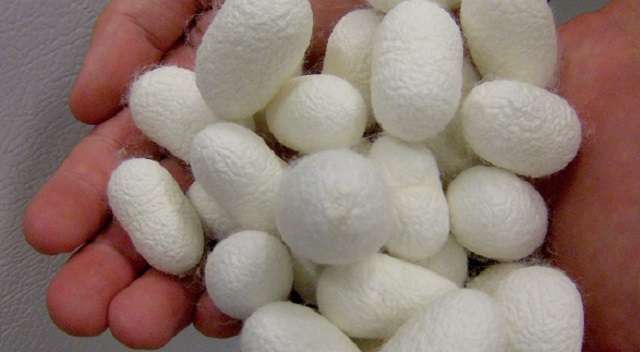May 10, 2016 report
Silk protein used to air-dry blood samples for remote testing

(Phys.org)—A team of researchers with Tufts University has developed a new way to store blood samples taken at remote locations—using a silk protein to stabilize blood samples without the need for cooling. In their paper published in Proceedings of the National Academy of Sciences, the team describes the silk protein, how it is used to preserve blood samples and how the results can be recovered via dissolution in water when ready for testing.
When an epidemic strikes in a remote location, medical personnel need to take blood samples to see who is infected and who is not—that is just one situation where blood samples are taken from people in remote locations and transported to a sometimes distant lab. But, blood samples taken in remote locations are notoriously difficult to preserve in useful ways—left alone proteins in blood may be consumed by enzymes in the blood or be deformed by heat. Where it is possible, such samples are refrigerated while being transported to a lab for testing. In places where cooling is not possible, one preservation technique that has been developed is to place droplets on a small sheet of cardboard and allow them to air dry. But this technique suffers from a small sample size and damage due to heat and/or humidity. In this new effort, the researchers describe a new approach they have developed using silk.
In a prior effort, some of the team members developed a silk powder and a silk solution for use in various applications. They found that when they mixed the powder with a blood sample and then allowed the result to air dry, that the blood remained stable, even when exposed to temperatures as high as 37 °C. Furthermore, all that was needed to make the preserved blood samples testable, was dipping them in water—almost all of the important proteins required for testing remained viable. They report that the technique proved to be more reliable than either normal drying or freezing.
The researchers acknowledge that thus far the idea is still in its infancy—testing has been done under ideal, controllable conditions. It still is not clear how well the samples would fare when exposed to real world conditions, such as a hot arid desert where there is a lot of dust or a muggy rain forest, and perhaps most importantly, when there may be long time delays. But the team plans to continue testing and if all goes well, to eventually mass produce their product for use in places where it is needed most.
More information: Jonathan A. Kluge et al. Silk-based blood stabilization for diagnostics, Proceedings of the National Academy of Sciences (2016). DOI: 10.1073/pnas.1602493113
Abstract
Advanced personalized medical diagnostics depend on the availability of high-quality biological samples. These are typically biofluids, such as blood, saliva, or urine; and their collection and storage is critical to obtain reliable results. Without proper temperature regulation, protein biomarkers in particular can degrade rapidly in blood samples, an effect that ultimately compromises the quality and reliability of laboratory tests. Here, we present the use of silk fibroin as a solid matrix to encapsulate blood analytes, protecting them from thermally induced damage that could be encountered during nonrefrigerated transportation or freeze–thaw cycles. Blood samples are recovered by simple dissolution of the silk matrix in water. This process is demonstrated to be compatible with a number of immunoassays and provides enhanced sample preservation in comparison with traditional air-drying paper approaches. Additional processing can remediate interactions with conformational structures of the silk protein to further enhance blood stabilization and recovery. This approach can provide expanded utility for remote collection of blood and other biospecimens empowering new modalities of temperature-independent remote diagnostics.
Journal information: Proceedings of the National Academy of Sciences
© 2016 Phys.org



















